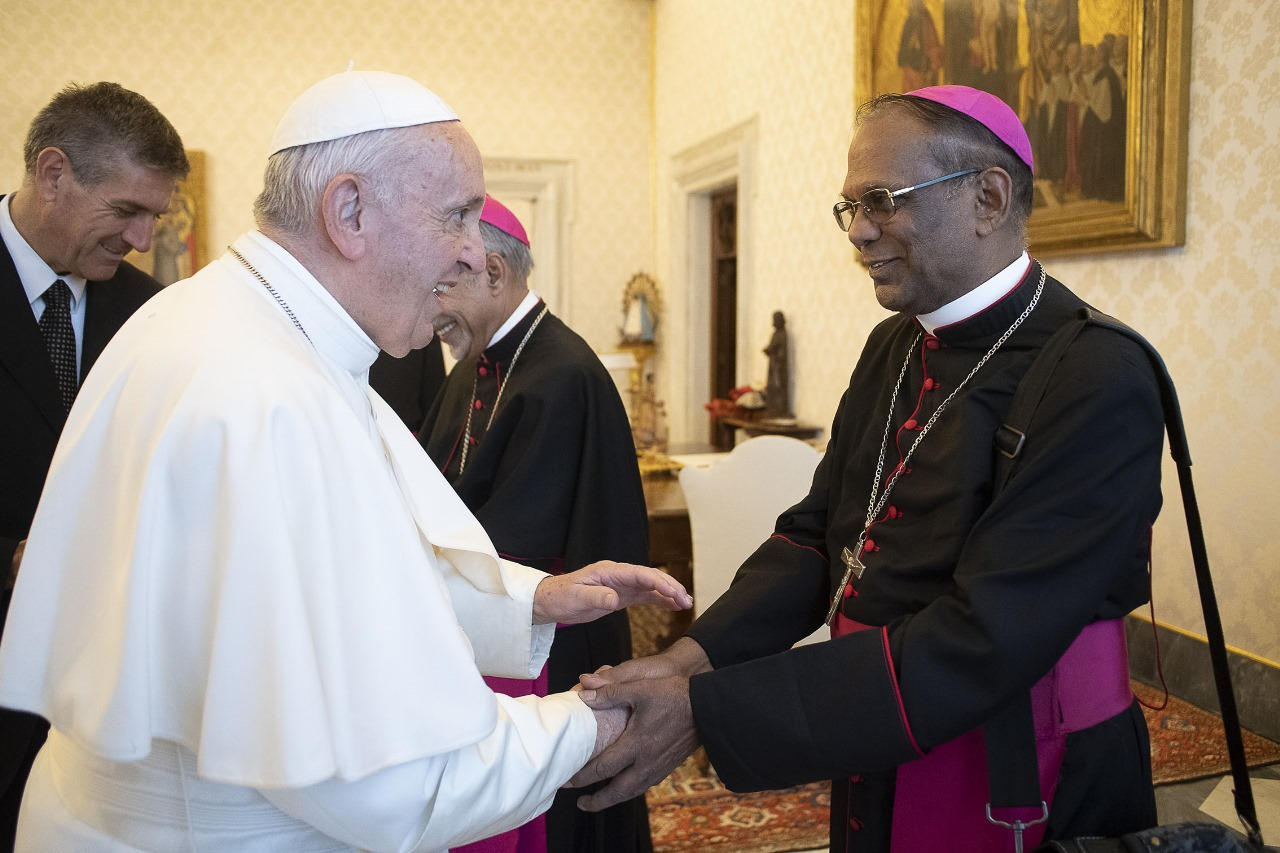Reflection on the Life and Papacy of Pope Francis

Bishop Alwyn Barreto during an interaction with Pope Francis.
The passing of Pope Francis has left a silence in the heart of the Church—one that echoes not with emptiness, but with the deep resonance of a life poured out in humble, joyful service of Christ and His people.
As I reflect on his Petrine ministry, I am drawn not first to the grand documents or even the sweeping reforms—though they were many and profound—but to the gentle, quiet moments that revealed the true soul of the man who bore the Fisherman’s Ring. He was a shepherd whose humility and Gospel witness reshaped my own understanding of episcopal ministry.
INTERACTIONS WITH POPE
The first time I met Pope Francis was in Sri Lanka, during the canonisation of Blessed Joseph Vaz. Standing there, amidst the vibrant joy of the faithful, I saw in the Holy Father not just the Vicar of Christ, but a man deeply attuned to the holiness of those on the peripheries.
The canonisation of St. Joseph Vaz, a Goan missionary and priest who ministered to the persecuted Church in Sri Lanka, was not just a liturgical act. It was, in itself, a theological statement by Pope Francis: that sanctity is found not only in the corridors of power or the cloisters of monasteries, but in the missionary heart that reaches out to the forgotten.
Later, when I was blessed to visit the Holy Father during our ad limina apostolorum, I witnessed a gesture that captured the essence of his pontificate. It was early morning. We bishops were still arriving, expecting to be ushered into the hall for our audience. But to our surprise, Pope Francis was already there, waiting at the door—not seated on a throne, not receiving us as dignitaries, but standing as a brother, a servant, a shepherd.
It was not merely a courteous gesture. It was an icon of his whole vision for the Church. In a world accustomed to power and position, Pope Francis lived the Gospel in radical humility. He did not just teach synodality—he lived it. He did not merely speak of mercy—he embodied it. His presence, his simplicity, his attentiveness to each bishop, priest, layperson, and even to the non-believer, revealed the face of the Father who ran to meet the prodigal son.
PAPACY ROOTED IN MERCY
Now that he has gone to the Father’s house, I find myself looking back not with sorrow alone, but with deep gratitude and joy. His was a papacy rooted in mercy, shaped by a listening heart, and propelled by the Gospel’s urgency. In Evangelii Gaudium, he invited the whole Church to recover the joy of the Gospel—not as a slogan, but as a missionary identity.
In Laudato Si’, he reminded us that creation is a sacred trust, and that the cry of the earth and the cry of the poor are one. In Fratelli Tutti, he drew from the parable of the Good Samaritan to awaken in us a wounded solidarity—a call to care even when it costs.
He was a man unafraid of contradiction—a Pope who knelt to wash feet of prisoners, kiss the feet of leaders as an act of solidarity, who dined with the homeless, who travelled to a war-torn country, and who never stopped calling us to “go out” to the peripheries. He did not seek to please factions or play politics. He sought only to follow Christ crucified—and to lead us along the same path. Even till the end, he never gave up the opportunity to meet with prisoners in Regina Coeli prison on Maundy Thursday and finally see the people (one last time) and bless them – on Easter Sunday- his final gift to the Church and the world.
I believe his legacy will not be measured merely by what he changed, but by how he loved. In him, we saw a glimpse of the Gospel not only preached, but enfleshed. A Church that listens. A Pope who weeps. A door left open—for the wounded, the doubting, the poor.
[The writer is Bishop Emeritus of the Diocese of Sindhudurg, who traces his roots to Siolim and Velsao]